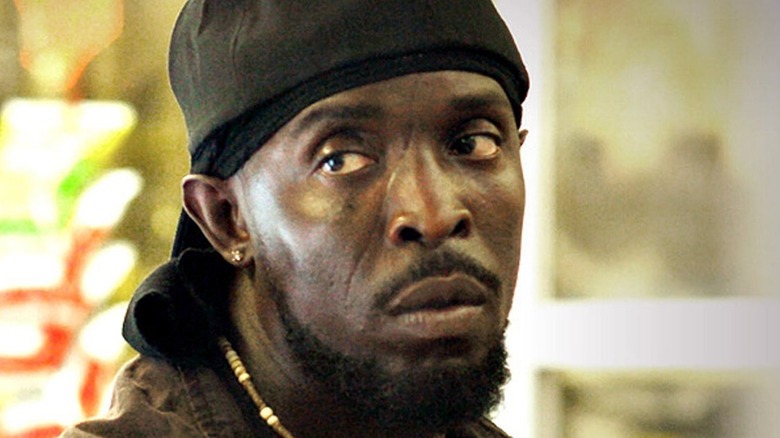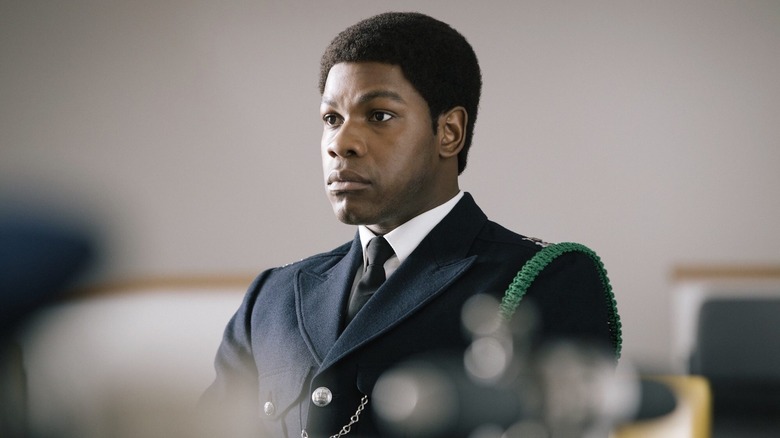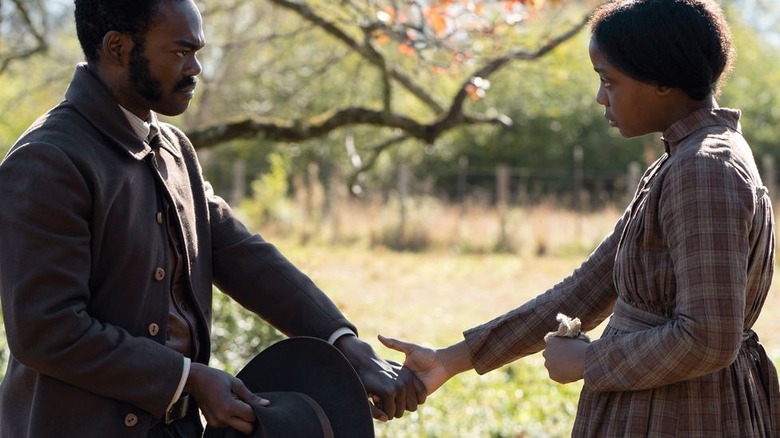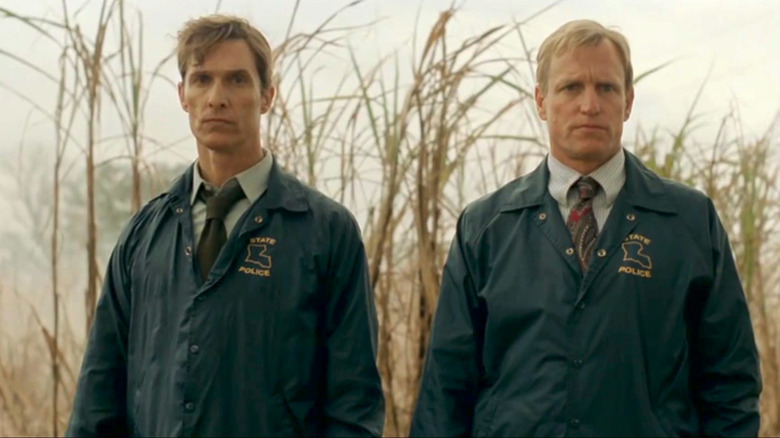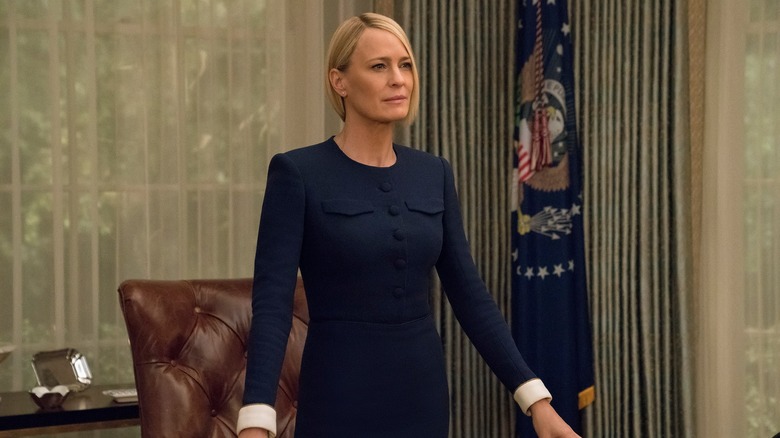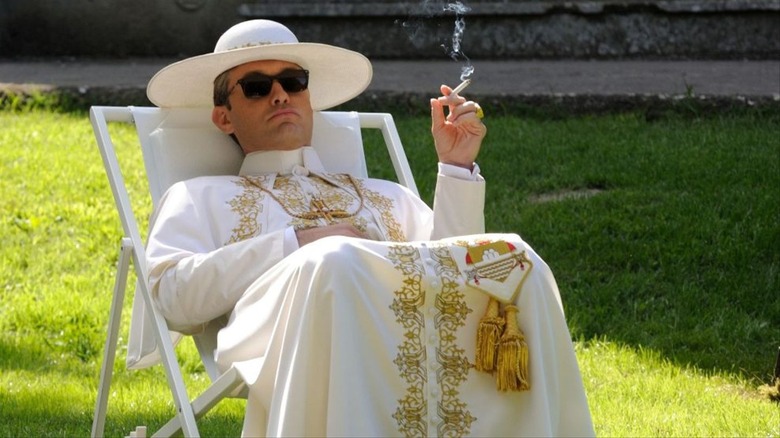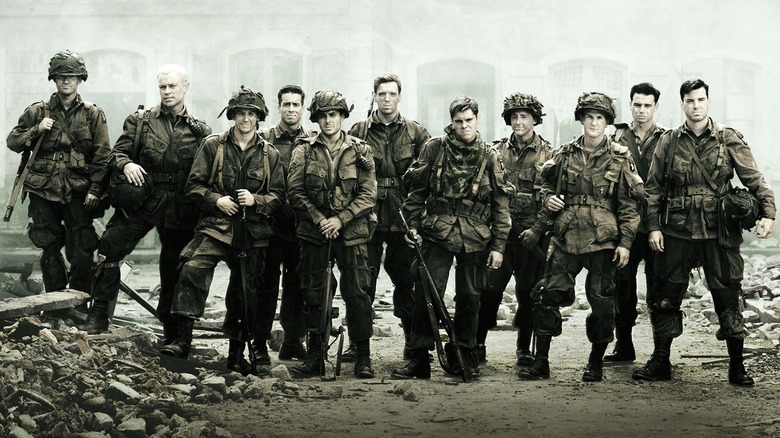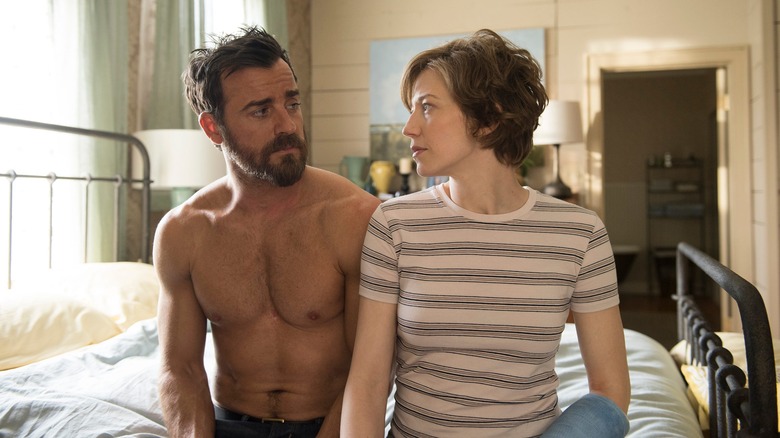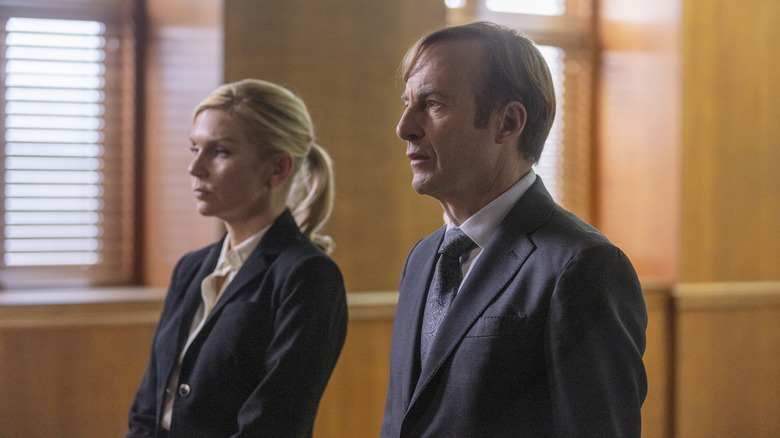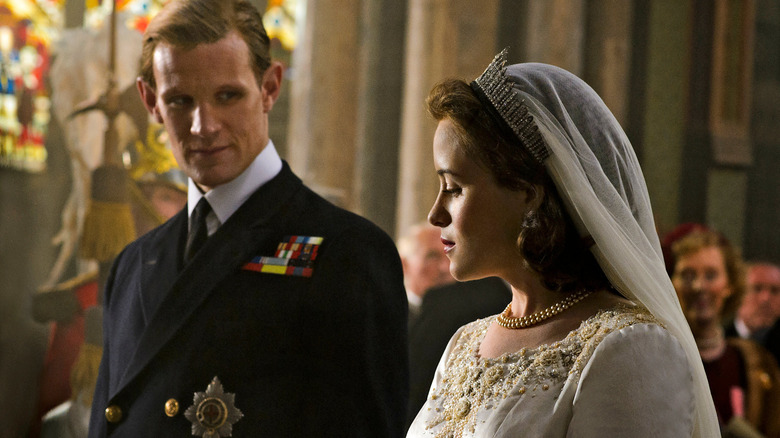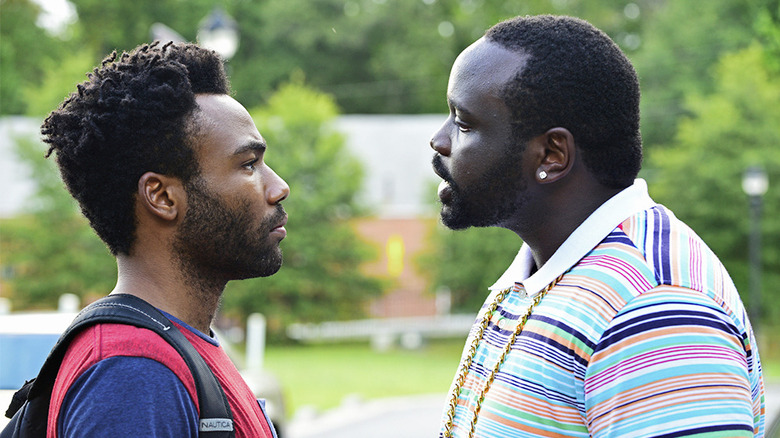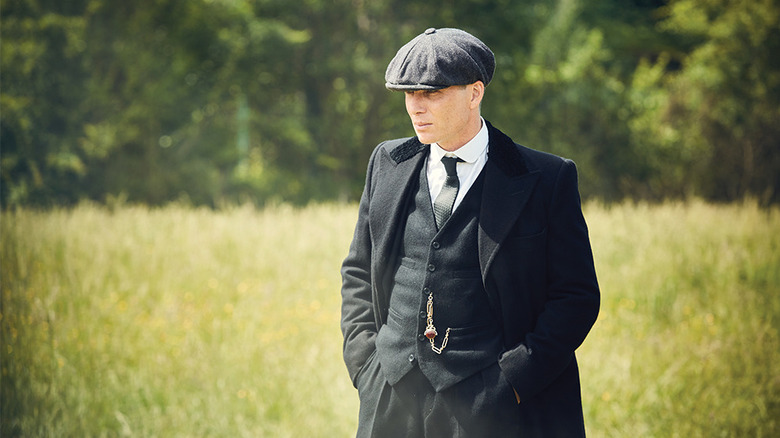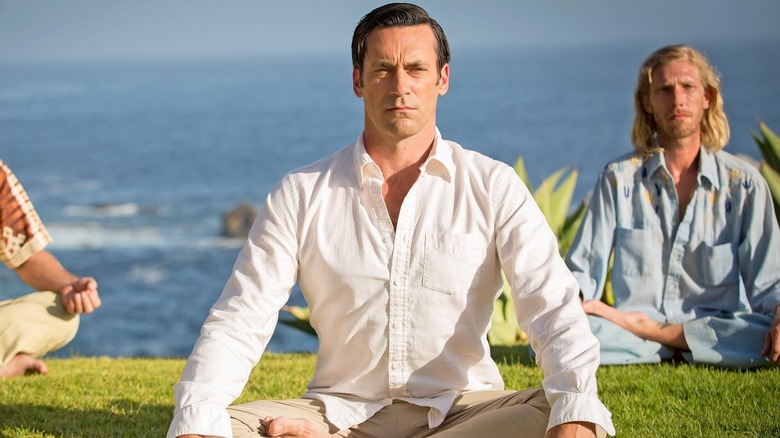12 Shows Like The Wire That Are Definitely Worth Watching
"The Wire" is one of the greatest television shows of all time. Alongside "The Sopranos" and "Breaking Bad," this gripping exploration of the drug trade in Baltimore was a hallmark of the early stage of "peak TV," in which networks like HBO and AMC proved they could tell compelling dramatic stories that matched (and frequently surpassed) the films playing in cinemas.
Showrunner David Simon poured copious amounts of research into his depiction of the show's sensitive subject material. Simon had worked as a police reporter in Baltimore for well over a decade before turning to TV work, and many of the characters on "The Wire" were inspired by real contacts he made during his journalistic career. The show's accuracy has been praised by law enforcement officers, politicians, and citizens alike, and even earned the attention of the Oval Office. Former U.S. President Barack Obama named it as his all-time favorite show, and met with Simon in the following years to discuss its relevance to the current political climate.
"The Wire" is uniquely structured in that it adds a layer of complexity with each subsequent season. Season 1 primarily focuses on the dueling perspectives of cops and criminals. Season 2 tacks on the corruption at Baltimore's docks, Season 3 shows the political process during a key election, Season 4 explores the education system through the perspective of young schoolboys, and Season 5 tackles Simon's home turf of the newsroom.
"The Wire" is thought-provoking, politically relevant, and filled with both charismatic characters and high drama. If you love it, check out these great shows, too.
Small Axe
TV has the power to break traditional storytelling molds and spotlight different perspectives in the same story. "The Wire" pushes that ability to its extreme, as each season refocuses the narrative by focusing on a new institution, while still retaining the core ensemble and ongoing storyline. The Amazon Prime anthology series "Small Axe" takes a similar approach to its material, albeit in a much shorter run.
Hailing from legendary filmmaker Steven McQueen ("12 Years a Slave," "Hunger," and "Shame"), the series features five films that spotlight key moments in African-American political and cultural history. While the film's stories are all unique and don't connect to each other, each one revolves around similar thematic discussions about the disparaging impacts of discrimination on generational development. Each of the five projects is gripping as a standalone, but they work even better when viewed in succession.
The first film, "Mangrove," follows a key court case in 1971 in which British courts unjustly ruled that racism existed on both sides of a violent raid by police on a peaceful Black-owned restaurant. "Lovers Rock" is an expressive party film following a romance amidst a reggae celebration, told in the style of French New Wave cinema.
"Red, White, and Blue" features the best performance of John Boyega's career as a struggling Black cop who faces internal suppression. "Alex Wheatle" stars Sheyi Cole in the titular role as a man adjusting to post-prison life. "Education" details flaws in the school system as Black children are deemed "subnormal" and subjected to inefficient resources, mentorship, and emotional guidance.
The Underground Railroad
Brilliant showrunners who take on issues that are uncomfortable can make for great television. While a docuseries can spotlight important subjects, crafting engaging characters that the audience forms an emotional bond with gives a personal touch that makes the issues feel even more devastating. Simon was never shy about showing shocking moments of violence on "The Wire;" the loss of young Wallace (Michael B. Jordan) in the show's 1st season is among the saddest deaths in television history.
Academy Award-winning filmmaker Barry Jenkins ("Moonlight," "If Beale Street Could Talk") tackled similarly challenging material with his adaptation of Colson Whitehead's historical fiction novel "The Underground Railroad." Set in the early 19th century, the series reimagines the clandestine network that runaway slaves used to escape as an actual secret passageway that ran between Georgia and the freedom promised in the northern states.
Like "The Wire," "The Underground Railroad" features a terrific ensemble of actors that respectfully depict complex characters. The emotional weight of the show lies in the romance between Cora Randall (Thuso Mbedu) and Caesar Garner (Aaron Pierre), who escape together in the series pilot. They are mercilessly tracked by the bounty hunter Arnold Ridgeway (Joel Edgerton) and his young companion Homer (Chase W. Dillon), a young Black child forced into servitude by his cruel master. The ensemble expands as Core reaches a free community, discovering a new romantic suitor in the charismatic Royal (William Jackson Harper).
True Detective
Depicting law enforcement on screen can be a difficult task. A showrunner wants to make the cop characters compelling, but it can be challenging to produce a dramatic story when the issues of police brutality and corruption are so often under the media spotlight. Showrunners often want to be respectful of honest police officers, while also acknowledging the systematic problems inherent to the institution. Simon fleshed out his police characters with the insights he gained from his years as a journalist in Baltimore. While the series' lead, Jimmy McNulty (Dominic West), is a hard-working, honest investigator (at least at first), many of his superiors have more sinister intentions.
HBO's crime anthology series "True Detective" is among the best cop shows of the 21st century, and reinvented the neo-noir serial killer story for a new generation. While the second and third installments debuted to more divisive responses, the 1st season is a near perfect eight-episode run. The season follows Louisiana State Police homicide detectives Rust Cohle (Matthew McConaughey) and Marty Hart (Woody Harrelson) as they investigate a series of enigmatic murders tied to a local cult.
With future "No Time to Die" director Cari Joji Funkunagua at the helm, "True Detective" broke barriers with its innovative filmmaking. It depicted Cohle and Harts' experiences through a nonlinear narrative that spans 17 years, giving Harrelson and McConaughey time to flesh out their roles while simultaneously exploring the mysteries of why they chose to give up the case, the identity of the killer, and how their partnership shattered.
House of Cards
"The Wire" delved deeply into the political process in its 3rd season, which revolved around the critical race between Councilman Tommy Carcetti (Aidan Gillen) and the corrupt incumbent mayor, Clarence Royce (Glynn Turman). Carcetti is young and ambitious, and sees an opportunity to appeal to voters based on Royce's inefficiencies and frequent public scandals. The season shows how each of their campaigns develop, as Royce is well-connected and has many allies within the police force. However, some long standing officials see Carcetti as a necessary new voice who could actually fix the city's infrastructure issues.
The meticulous detail inherent to the political process isn't easy to depict on television, but the American reboot of "House of Cards" depicted the ins and outs of Washington D.C. in an engaging, nuanced way. When the series debuted as Netflix's first major original production, many were skeptical that a streaming service could actually pull off a compelling drama series, but just as "The Wire" brought newfound respect to HBO, "House of Cards" kickstarted Netflix's game-changing success.
The series follows presidential cabinet member Frank Underwood (Kevin Spacey), who concocts a scheme to rise within the executive branch after he's denied the position he was promised. Underwood works under the guidance of his wife Claire (Robin Wright), who is essentially the show's Lady Macbeth. Although the sexual misconduct allegations against Spacey temporarily halted production on the series, Wright took center stage for the show's 6th and final season.
The Young Pope
The acclaim for "The Wire" proved to HBO that shows that focusing on niche subject material from individualistic showrunners could leave a longstanding legacy, even if they only received average ratings and weren't immediately showered with awards. "The Wire" is often compared to "The Sopranos," but David Chase's mafia series was a colossal success that sparked frequent pop cultural discourse, received many Primetime Emmy wins and nominations, and resulted in massive viewership hikes for the network. Comparably, "The Wire" took time to permeate, but the reputation of its Shakespearean storytelling has only grown in the years since it left the air.
The legacy of "The Wire" allowed HBO to greenlight a project as unique as "The Young Pope." An arthouse drama from Italian filmmaker Paolo Sorrentino ("The Great Beauty," "Youth," "This Must Be the Place"), the series focuses on the fight for power at the very top of the Catholic Church. Like "The Wire," it features meticulously detailed insights into processes, rivalries, and shaky political alliances. However, Sorrentino's stylistic flourishes are completely unique, and brought arthouse filmmaking to its Sunday night audience.
The show focuses on Pope Pius XIII (Jude Law), the youngest person — and first American — to ever hold the office. Pius XIII is brash and disrupts traditional practices in the Vatican, courting enemies among the Church's powerful members. It's a fascinating deconstruction of faith itself, as Pius XIII struggles to both identify his beliefs and also implement them.
Band of Brothers
"The Wire" balanced its connected storylines delicately, as story threads carried over throughout the seasons and some of the most iconic characters never shared screen time together. Simon's goal with "The Wire" wasn't to tell just one specific story, but rather to give an overview of the political, economic, cultural, and emotional consequences of the policies and infrastructure in Baltimore. Each building block features a snapshot into the lives of its characters, and as a result the show becomes overwhelmingly emotional when our favorite characters affect — or are affected by — the overall process.
Executive producers Tom Hanks and Steven Spielberg took on a similarly ambitious task when capturing the history of the "Easy" Company of the U.S. Army's 101st Airborne Division during the heights of World War II. Produced with one of the highest budgets in HBO's history, the 10 episode miniseries chronicles the heroism of real veterans from the moment they begin basic training to their gripping last days in combat during the final conflicts in Japan. Like "The Wire," it was extensively researched in order to be as accurate as possible.
"The Wire" introduces many characters throughout its run, and while trying to identify each of their relationships may be confusing at first, each actor embellishes their role with an earnest performance and forges an emotional connection with the audience. "Band of Brothers" has about two dozen series leads, each one worthy of an emotional investment.
The Leftovers
Watching the pilot of "The Wire" can be overwhelming. In the hour-long episode "The Target," countless characters are introduced, as are the recurring themes of the corrupt court systems, the rise of the Barksdale operation, drug addiction on the streets, inefficient police policies, and the impact the violence has on younger city residents.
But new viewers shouldn't be scared off if they initially find things hard to follow, because Simon takes the time to flesh out each of the story beats and craft engaging characters. By the time that the series finale "-30-" aired in March 2008, the montage sequence exploring each of the characters' fates was a moving conclusion that showed the progress (and, sometimes, the lack thereof) that had been made over the five seasons, and teased future events.
Damon Lindelof's science fiction series "The Leftovers" found a similar balance, starting off from a place of confusion, tying the segmented narrative together, and then landing a perfect season finale. "-30-" may have saved what most fans would agree was a disappointing final season, but "The Leftovers" finale, "The Book of Nora," is one of the greatest final episodes in television history. It was a personal win for Lindelof after the divisive response to the ending of "Lost."
The series follows the residents of Mapleton, New York three years after a supernatural occurrence caused 2% of the world's entire population to disappear. Lindelof focuses less on the mystery than he does on how people respond to the crisis and cope with loss.
Better Call Saul
"The Wire" does a great job showing a realistic depiction of the legal process. Lawyer characters have been popular on television since the original "Perry Mason" aired in the 1950s, but most drama series are wildly different from reality. "The Wire" took time to show that the challenges of developing a winning case can't be wrapped up in a simple 45 minutes, and developed many compelling characters, particularly the whip-smart state attorney Rhonda Pearlman (Deirdre Lovejoy).
It's not quite as grounded, but "Breaking Bad" took a similarly meticulous approach to exploring the relationship between drug cartels and their legal allies and opponents, particularly through the fan-favorite character Saul Goodman (Bob Odenkirk). A fast-talking lawyer with a flexible moral code, Saul operates a shady strip mall office and becomes an ally to Walter White (Bryan Cranston) and Jesse Pinkman (Aaron Paul). Saul's adventures were just as interesting as the drug trafficking storyline at the show's center, so after Vince Gilligan wrapped "Breaking Bad," he chose to explore Saul's origins in the spinoff series "Better Call Saul."
A pathetic public defender working grueling cases for ungrateful clients, Jimmy McGill lives under the shadow of his successful brother Chuck (Michael McKean). Chuck is a senior partner at the prestigious law office Hamlin, Hamlin & McGill, and Jimmy seeks to contend with his brother's success by working unusual and ambitious cases. Spreading his morality thin, he crafts the persona Saul Goodman in order to become more appealing to his morally-challenged clients.
The Crown
The political process is far from simple, as public duty is rarely satisfying given how hard it is to enact real change. "The Wire" showed how grueling public service can be, and the emotional toll that it takes on the people involved. Characters like Norman Wilson (Reg E. Cathey) and Cedric Daniels (Lance Reddick) experience frustration when they enter the political game. Their good motivations don't produce the results that they imagined.
If politics can feel devoid of passion, then the groundbreaking Netflix historical drama series "The Crown" certainly comes as a surprise. The series explores the inner workings of the British Royal Family across numerous decades, showing how family history, personal beliefs, and public personas all play into the key decisions affecting both Great Britain and the entire world stage. In the post-World War II era, England is forced to question its role as a superpower.
The first two seasons focus on a young Queen Elizabeth (Claire Foy) during her marriage to the ambitious Prince Phillip (Matt Smith). Elizabeth is thrust into the role after the death of her father King George VI (Jared Harris), and contends with the strong-willed prime minister, Winston Churchill (John Lithgow). Elizabeth must also contend with the behavior of her erratic younger sister, Princess Margaret (Vanessa Kirby). Season 3 recast the roles of Elizabeth, Phillip, and Margaret with Olivia Colman, Tobias Menzies, and Helena Bonham Carter, respectively. Season 4 introduced the compelling romance between Prince Charles (Josh O'Connor) and Princess Diana (Emma Corin).
Atlanta
One of the best elements of the peak TV era is the way it's opened up television to stories from underrepresented voices. "The Wire" had a diverse writers' room that helped spotlight critical themes like race relations and police brutality, and the show featured a great ensemble of Black cast members, including Idris Elba in his breakout role. Creative genius Donald Glover's groundbreaking FX series "Atlanta" explores the population of its titular city through Glover's unique perspective.
Glover stars as the struggling college dropout Earnest Marks, who becomes the manager for his musician cousin Peper Boi (Brian Tyree Henry). Paper Boi unexpectedly becomes a local sensation, and Earnest tries to support his success while reconnecting with his ex-girlfriend Vaneesa Keefer (Zazie Beetz), who discovers that she is pregnant. Like "The Wire," "Atlanta" doesn't adhere to the traditional formats of serialized television and frequently features experimental episodes that explore side characters. Among the most memorable deviations are the horror-themed "Teddy Perkins," the news-focused "B.A.N.," and the extended awkward party conversation of "Juneteenth."
Peaky Blinders
The Barksdale operation on "The Wire" is fascinating because it forces the characters to combine their personal and professional responsibilities. There's a genuine empathy between Avon Barksdale (Wood Harris) and his nephew D'Angelo (Larry Gilliard Jr.), and characters like Stringer Bell (Idris Elba) and Bodie Broadus (J.D. Williams) must also contend with their familial roles in the face of an ongoing police investigation. It makes their confrontations more compelling, as they are dealing with personal pressures alongside the stress of managing an illegal crime syndicate.
The historical fiction series "Peaky Blinders" explores the challenging dynamics within an English crime family in the post-World War I era. Siblings Thomas Shelby (Cillian Murphy), Arthur (Paul Anderson), John (Joe Cole), Ada (Sophie Rundle), and their aunt Polly Gray (Helen McCrory) aim to preserve their familial legacy as they expand their operation and come into conflict with the cruel Chief Inspector Campbell (Sam Neill). The situation grows more complex when Thomas falls in love with the enigmatic Grace (Anabelle Wallis), who secretly works alongside Campbell to unravel their operation from within.
Mad Men
Few characters on "The Wire" are purely good or evil, and the series excels at getting the audience to empathize with people who have flexible morals. Even the seemingly well-intentioned McNulty shows an unsympathetic side when he falsifies evidence in the show's 5th season, and a character as ruthless as Stringer still has a sensitive and romantic side. Hit AMC series "Mad Men" is full of similar complexities, as it deals with advertisers in the '60s whose job it is to sell an idea, no matter what it is.
"Mad Men" follows the charismatic creative director Don Draper (Jon Hamm), who hides his secret history from his wife Betty Francis (January Jones) and their young daughter Sally (Kiernan Shipka). Don has a longstanding personal relationship with the senior partner of his firm, Roger Sterling (John Slattery), and Roger's eccentricities often push Don to make unfortunate decisions. Don has a nuanced relationship with his young secretary Peggy Olson (Elisabeth Moss); he's initially skeptical of Peggy's abilities, but grows impressed by her hard work and creative capacity, and ultimately takes her on as his de facto apprentice.
